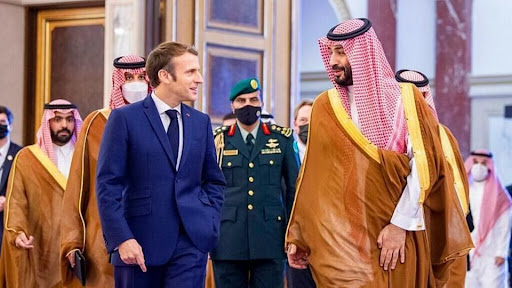Speaking in an interview with the website of the Strategic Council on Foreign Relations, Abolqasem Delfi noted that Macron’s visit to Saudi Arabia, the UAE and Qatar has several consequences and further reveals France’s strategies in the Persian Gulf and the Middle East, adding: France’s thought-provoking positions in conditions under which the Vienna talks are underway, must be taken into account by domestic and responsible circles.
France’s immense military contract with UAE
Recalling that Macron began his visit with the UAE as the first partner of France in the political-economic dimension in the region, he added: The UAE and France have strategic partnerships based on an agreement signed in 1999 and renewed every 10 years. France has a military base in the UAE, and according to a statement of the Elysee Palace, during the trip, a contract was signed for the sale of 80 Rafale fighter jets and 12 Caracal helicopters and supply of spare parts for UAE military equipment worth 16.5 billion euro (20 billion dollars), which is one of the largest contracts France has been able to sign in recent years.
Delfi said: After cancellation of the contract for the sale of French submarines to Australia, as a result of which the country’s defense and military industries had some problems, the military contract with the UAE revived France in terms of sales and exports of military products.
Referring to other economic, trade and energy agreements signed between France and the UAE worth about 15 billion euros, the former Iranian ambassador to Paris continued: For France, achievements of that trip in the military and economic fields has been very significant, especially since that country is approaching holding presidential elections, and Macron needs such agreements in order to enter the elections in a better situation.
France seeking restoration of its position in the region
Emphasizing that France has an economic and security-military view of the region, he added: France is one of the countries that is trying hard to revive its reduced political presence in the Middle East and the Persian Gulf in the past decade and following withdrawal of the United States, and its intention to reduce its presence in the region, it intends to regain its former position and fill in the US vacuum in the region as much as possible.
Delfi said: The UAE and France have common positions in political issues; regarding the developments in Libya, the two countries are on one side of the tensions and conflicts, and the UAE supports France’s position on a large scale on African issues, especially in the coastal region. Meanwhile, establishment of relations between the UAE within the framework of Abraham’s Accord with the Zionist regime was highly welcomed and supported by Macron during this trip.
France ignoring consequences of arms influx into the region
The international affairs analyst, referring to France’s criticism of regional positions, as well as the issue of Iran’s nuclear issue, which he has always considered as a source of threat and tension, he added: They are trying to seize every opportunity to put pressure on the Islamic Republic of Iran, while with Macron’s visit to the region, it became clear that France had no hesitation in arming and selling weapons to the region, and that the consequences of the influx of this volume of French military weapons into the region were of little importance to him.
Saying that France knows that the influx of such weapons will affect the security balance in the region, he noted: Part of this imbalance has to do with Iran, and we have to react to those moves by the French and other countries, especially Britain. Meanwhile, during the nuclear talks, France emphasizes more than anything else on the discussion of Iran’s defense issues.
Delfi further referred to close relations of France with Doha in the socio-political and economic spheres, especially Qatar’s extensive investment in French sports, and said: Qataris have invested in most French teams, and we are clearly seeing this in the Paris Saint-Germain team. Even Qatar has used French in its scientific and educational environments, and France is one of the strong points of Qatar’s European and Western relations. Qatar’s military relations with France, although not as good as those with the UAE and Saudi Arabia, are at a high level.
The former Iranian ambassador in Paris also discussed the talks that took place during Macron’s visit to Saudi Arabia and stated: France is a serious supporter of the Saudi coalition in the Yemen war, and during that visit it also supported the Saudi position in Yemen and condemned the use of missiles and drones by Yemen.
France’s thought-provoking stance on Iran
Stating that the French President’s visit to Riyadh had a more prominent political component, he referred to the consultations on Lebanon and stressed: The positions of Paris and Riyadh on the Iranian issue were very thought-provoking and unacceptable.
He stressed: France is apparently looking for a partner in its analysis in the region.
Referring to the approach of the elections in France, Delfi said: This kind of movement in the region and the expenses that the region is making for Macron, shows that the re-election of Macron for the next five years is on the agenda of the PGCC countries and part of the region. If we do not act consciously on this strategy and carefully regulate relations with European countries, this is not a process that can serve the interests of Iran and the peace and stability it seeks in the long run.










0 Comments